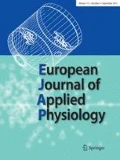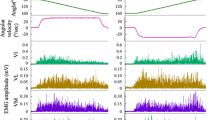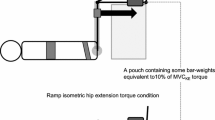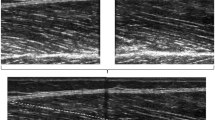Abstract
We tested activation patterns of individual muscles and neuromuscular compartments (NMCs) of the quadriceps femoris (QF) during knee-extension exercises (KEE). Eight healthy men performed repetitive isokinetic KEE at 120° s−1. Before and after KEE, muscle functional magnetic resonance images of the thigh were taken to calculate transverse relaxation times (T2) for the individual muscles of the QF. In terms of exercised T2, a moderate correlation was observed between the rectus femoris (RF) and vastus medialis (VM) (r=0.493, P<0.001), and between the vastus lateralis (VL) and VM (r=0.347, P<0.01). Furthermore, a strong correlation was also observed between the vastus intermedius (VI) and VM (r=0.719, P<0.0001), and between the VL and VI (r=0.783, P<0.0001). There was a significant difference in T2 between the proximal and distal NMCs of the RF. We conclude that at least two strategies are applied for force production in the human QF: (1) coactivation of specific pairs of individual muscles and (2) regional-specific activation in NMCs in the RF.



Similar content being viewed by others
References
Adams GR, Duvoisin MR, Dudley GA (1992) Magnetic resonance imaging and electromyography as indexes of muscle function. J Appl Physiol 73:1578–1583
Adams GR, Harris RT, Woodard D, Dudley GA (1993) Mapping of electrical muscle stimulation using MRI. J Appl Physiol 74:532–537
Akima H, Takahashi H, Kuno S, Masuda K, Masuda T, Shimojo H, Anno I, Itai Y, Katsuta S (1999) Early phase adaptations of muscle use and strength to isokinetic training. Med Sci Sports Exerc 31:588–594
Akima H, Ito M, Yoshikawa H, Fukunaga T (2000a) Recruitment plasticity of neuromuscular compartments in exercised tibialis anterior using echo-planar magnetic resonance imaging in humans. Neurosci Lett 296:133–136
Akima H, Kuno S, Takahashi H, Fukunaga T, Katsuta S (2000b) The use of magnetic resonance images to investigate the influence of recruitment on the relationship between torque-cross-sectional area in human muscle. Eur J Appl Physiol 83:475–480
Akima H, Foley JM, Prior BM, Dudley GA, Meyer RA (2002) Vastus lateralis fatigue alters recruitment of musculus quadriceps femoris in humans. J Appl Physiol 92:679–684
Akima H, Ushiyama J, Kubo J, Tonosaki S, Itoh M, Kawakami Y, Fukuoka H, Kanehisa H, Fukunaga T (2003) Resistance training during unweighting maintains muscle size and function in human calf. Med Sci Sports Exerc 35:655–662
Azuma K, Homman S, Kagaya A (2000) Oxygen supply-consumption balance in the thigh muscles during exhausting knee-extension exercise. J Biomed Opt 5:97–101
Bizzi E, Tresch MC, Saltiel P, d’Avella A (2000) New perspectives of spinal motor systems. Nat Rev Neurosci 1:101–108
Buchanan TS, Almdale PJ, Lewis JL, Rymer WZ (1986) Characteristics of synergic relations during isometric contractions of human elbow muscles. J Neurophysiol 56:1225–1241
Carrasco DI, Lawrence J III, English AW (1999) Neuromuscular compartments of cat lateral gastrocnemius produce different torques about the ankle joint. Motor Control 3:436–446
Chanaud CM, Pratt CA, Loeb GE (1991a) Functional complex muscles of the cat hindlimb. II. Mechanical and architectural heterogenity within the biceps femoris. Exp Brain Res 85:257–270
Chanaud CM, Pratt CA, Loeb GE (1991b) Functional complex muscles of the cat hindlimb. V. The role of histochemical fiber-type regionalization and mechanical heterogeneity in differential muscle activation. Exp Brain Res 85:300–313
Conley MS, Stone MH, Nimmons M, Dudley GA (1997) Resistance training and human cervical muscle recruitment plasticity. J Appl Physiol 83:2105–2111
Conwit RA, Tracy B, Cowl A, McHugh M, Stashuk D, Brown WF, Metter EJ (1998) Firing rate analysis using decomposition-enhanced spike triggered averaging in the quadriceps femoris. Muscle Nerve 21:1338–1340
Conwit RA, Stashuk D, Tracy B, McHugh M, Brown WF, Metter EJ (1999) The relationship of motor unit size, firing rate and force. Clin Neurophysiol 110:1270–1275
Doorenbosch CAM, Welter TG, Ingen Schenau GJV (1997) Intermuscular co-orgination during fast contract control leg tasks in man. Exp Brain Res 751:239–246
Ebenbichler G, Kollmitzer J, Quittan M, Uhl F, Kirtey C, Fialka V (1998a) EMG fatigue patterns accompanying isometric fatiguing knee-extensions are different in mono- and bi-articular muscles. Electroencephalogr Clin Neurophysiol 109:256–262
Ebenbichler GR, Kollmitzer J, Glockler L, Bochdansky T, Kopf A, Fialka V (1998b) The role of the biarticular agonist and cocontracting antagonist pair in isometric muscle fatigue. Muscle Nerve 21:1706–1713
English AW, Letbetter WD (1982) Anatomy and innervation parternes of cat lateral gastrocnemius and plantaris muscle. Am J Anat 164:64–77
English AW, Wolf SL, Segal RL (1993) Compartmentalization of muscles and their motor nuclei: the partitioning hypothesis. Phys Ther 73: 857–867
Fisher MJ, Meyer RA, Adams GR, Foley JM, Potchen EJ (1990) Direct relationships between proton T2 and exercise intensity in skeletal muscle MR images. Invest Radiol 25:480–485
Fleckenstein JL, Canby RC, Parkey RW, Peshock RM (1988) Acute effects of exercise on MR imaging of skeletal muscle in normal volunteers. Am J Roentgenol 151:231–237
Fleckenstein JL, Watumull D, McIntire DD, Bertocci LA, Chason DP, Peshock RM (1993) Muscle proton T2 relaxation times and work during repetitive maximal voluntary exercise. J Appl Physiol 74:2855–2859
Fukunaga T, Roy RR, Shellock FG, Hodgson JA, Edgerton VR (1996) Specific tension of human plantar flexors and dorsiflexors. J Appl Physiol 80:158–165
Grillner S (1981) Control of locomotion in bipes, terapods and fish. In: Brooks VB (ed) Handbook of physiology, vol 2. American Physiological Society, Bethesda, Md., pp 1179–1236
Hayashi M, Hanakawa S, Senda M, Takahara Y (1998) Evaluation of the thigh muscles after knee exercise on a Cybex II. Acta Med Okayama 52:155–160
Herrmann U, Flanders M (1998) Directional tuning of single motor units. J Neurosci 18:8402–8416
Ito M, Akima H, Fukunaga T (2000) In vivo moment arm determination using B-mode ultrasonography. J Biomech 33:215–218
Jacobs R, Bobbert MF, Ingen Schenau GJV (1996) Mechanical output from individual muscles during explosive leg extension: the role of biarticular muscles. J Biomech 29:513–523
Jenner G, Foley JM, Cooper TG, Potchen EJ, Meyer RA (1994) Changes in magnetic resonance images of muscle depend on exercise intensity and duration, not work. J Appl Physiol 76:2119–2124
Kouzaki M, Shinohara M, Fukunaga T (1999) Non-uniform mechanical activity of quadriceps muscle during fatigue by repeated maximal voluntary contraction in humans. Eur J Appl Physiol 80: 9–15
Kukulka CG, Clamann HP (1981) Comparison of the recruitment and discharge properties of motor units in human brachial biceps and adductor pollicis during isometric contractions. Brain Res 219:45–55
Lexell J, Henriksson-Larsen K, Sjostrom M (1983) Distribution of different fibre types in human skeletal muscles. 2. A study of cross-sections of whole m. vastus lateralis. Acta Physiol Scand 117:115–122
Meyer RA, Prior BM (2000) Functional magnetic resonance imaging of muscle. Exerc Sport Sci Rev 28:89–92
Nichols TR, Cope TC, Abelew TA (1999) Rapid spinal mechanisms of motor control. In: Holloszy JO (ed) Exercise and Sport Science Review. Lippincott Williams and Wilkins, Philadelphia, pp 255–284
Pearson KG (2000) Neural adaptation in the generation of rhythmic behavior. Annu Rev Physiol 62:723–753
Ploutz LL, Tesch PA, Biro RL, Dudley GA (1994) Effect of resistance training on muscle use during exercise. J Appl Physiol 76:1675–1681
Ploutz-Snyder LL, Convertino VA, Dudley GA (1995a) Resistance exercise-induced fluid shifts change in active muscle size and plasma volume. Am J Physiol 269: R536–R543
Ploutz-Snyder LL, Tesch PA, Crittenden DJ, Dudley GA (1995b) Effect of unweighting on skeletal muscle use during exercise. J Appl Physiol 79:168–175
Ploutz-Snyder LL, Nyren S, Cooper TG, Potchen EJ, Meyer RA (1997) Different effects of exercise and edema on T2 relaxation in skeletal muscle. Magn Reson Med 37:676–682
Ray CA, Dudley GA (1998) Muscle use during dynamic knee extension: implication for perfusion and metabolism. J Appl Physiol 85:1194–1197
Richardson RS, Frank LR, Haseler LJ (1998) Dynamic knee-extensor and cycle exercise: Functional MRI of muscular activity. Int J Sports Med 19:182–187
Sacco P, Newberry R, McFadden L, Brown T, McComas AJ (1997) Depression of human electromyographic activity by fatigue of a synergistic muscle. Muscle Nerve 20:710–717
Shellock RG, Fukunaga T, Mink JH, Edgerton VR (1991) Acute effects of exercise on MR imaging of skeletal muscle: concentric vs. eccentric actions. Am J Roentgenol 156: 765–768
Shinoda Y, Yokota J, Futami T (1981) Divergent projection of individual corticospinal axons to motoneurons of multiple muscles in the monkey. Neurosci Lett 23:7–12
Ter Haar Romeny BM, Denier Van Der Gon JJ, Gielen CCAM (1982) Changes in recruitment order of motor units in the human biceps muscle. Exp Neurol 78:360–368
Ter Haar Romeny BM, Denier Van Der Gon JJ, Gielen CCAM (1984) Relation between location of a motor unit in the human biceps brachii and its crtical firing levels for different tasks. Exp Neurol 85:631–650
Tresch MC, Saltiel P, Bizzi E (1999) The construction of movement by the spinal cord. Nat Neurosci 2:162–167
Vandenborne K, Walter G, Ploutz-Snyder L, Dudley G, Elliott MA, Meirleir KD (2000) Relationship between muscle T2* relaxation properties and metabolic state: a combined localized 31P-spectroscopy and 1H-imaging study. Eur J Appl Physiol 82:76–82
Van Zuylen EJ, Gielen CCAM, Denier Van Der Gon JJ (1988) Coordination and inhomogeneous activation of human muscles during isometric torques. J Neurophysiol 60:1523–1548
Weidman ER, Charles HC, Negro-Vilar R, Sullivan MJ, Macfall JR (1991) Muscle activity localization with 31P spectroscopy and calculated T2-weighted 1H images. Invest Radiol 26:309–316
Yang D, Morris SF (1999) Neurovascular anatomy of the rectus femoris muscle related to functioning muscle transfer. Plast Reconstr Surg 104:102–106
Yue G, Alexander AL, Laidlaw DH, Gmitro F, Unger EC, Enoka RM (1994) Sensitivity of muscle proton spin-spin relaxation time as an index of muscle activation. J Appl Physiol 77:84–92
Acknowledgement
The authors gratefully acknowledge the help given by Dr. Katsumi Kose at University of Tsukuba for technical assistance with creating T2 images.
Author information
Authors and Affiliations
Corresponding author
Rights and permissions
About this article
Cite this article
Akima, H., Takahashi, H., Kuno, Sy. et al. Coactivation pattern in human quadriceps during isokinetic knee-extension by muscle functional MRI. Eur J Appl Physiol 91, 7–14 (2004). https://doi.org/10.1007/s00421-003-0942-z
Accepted:
Published:
Issue Date:
DOI: https://doi.org/10.1007/s00421-003-0942-z




